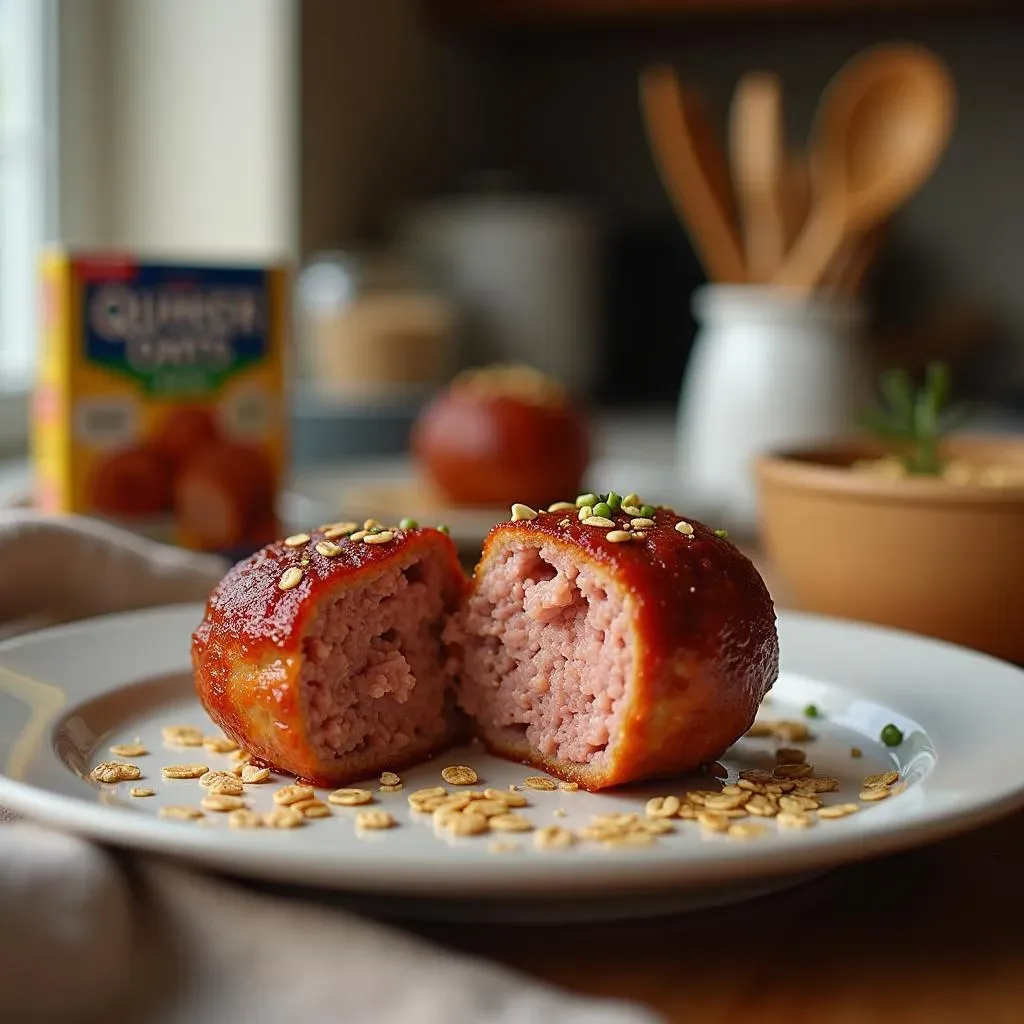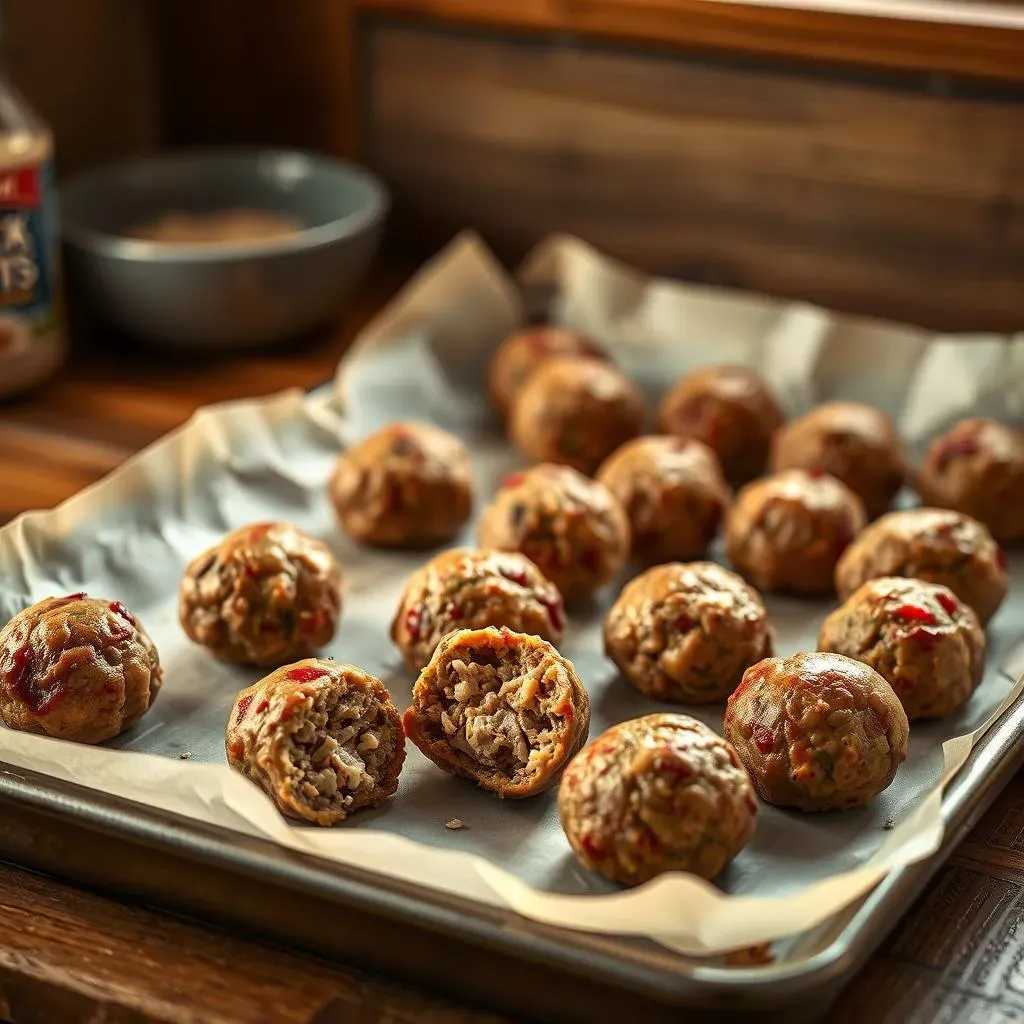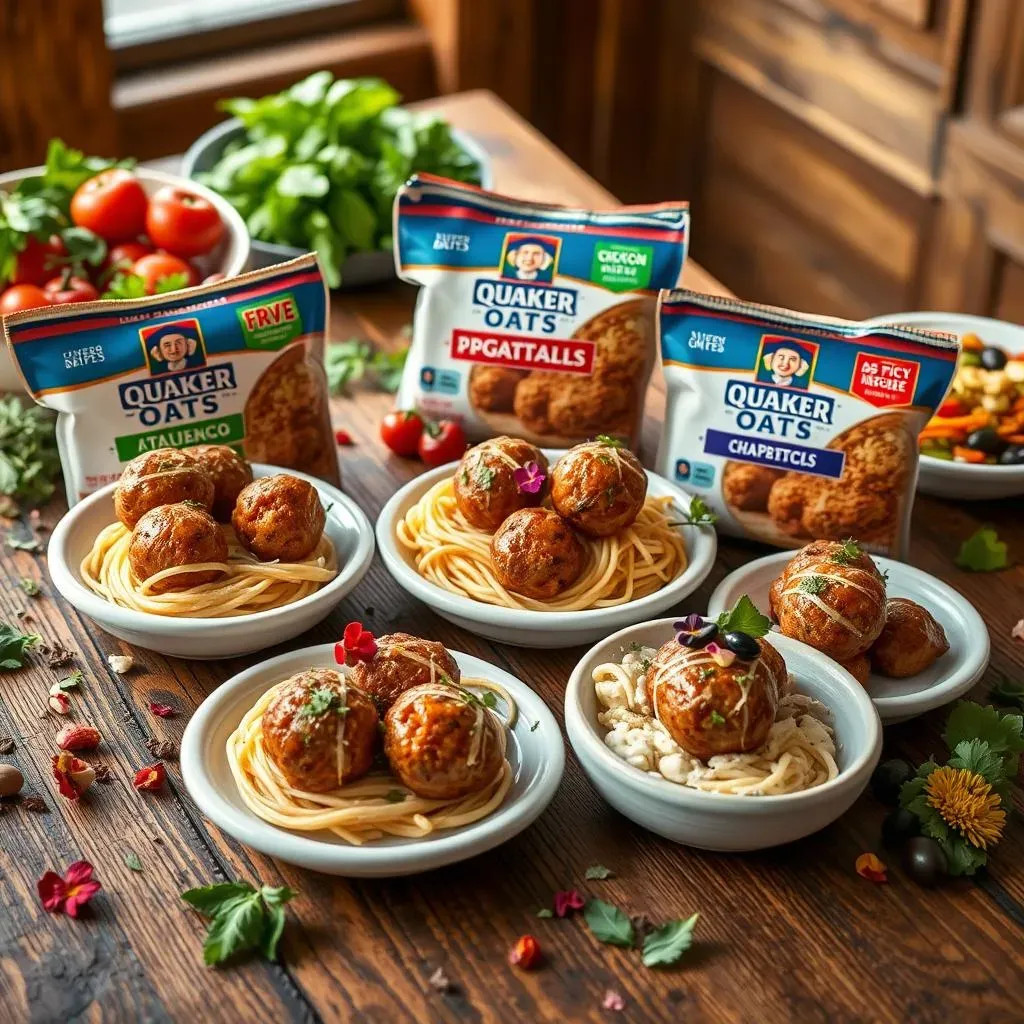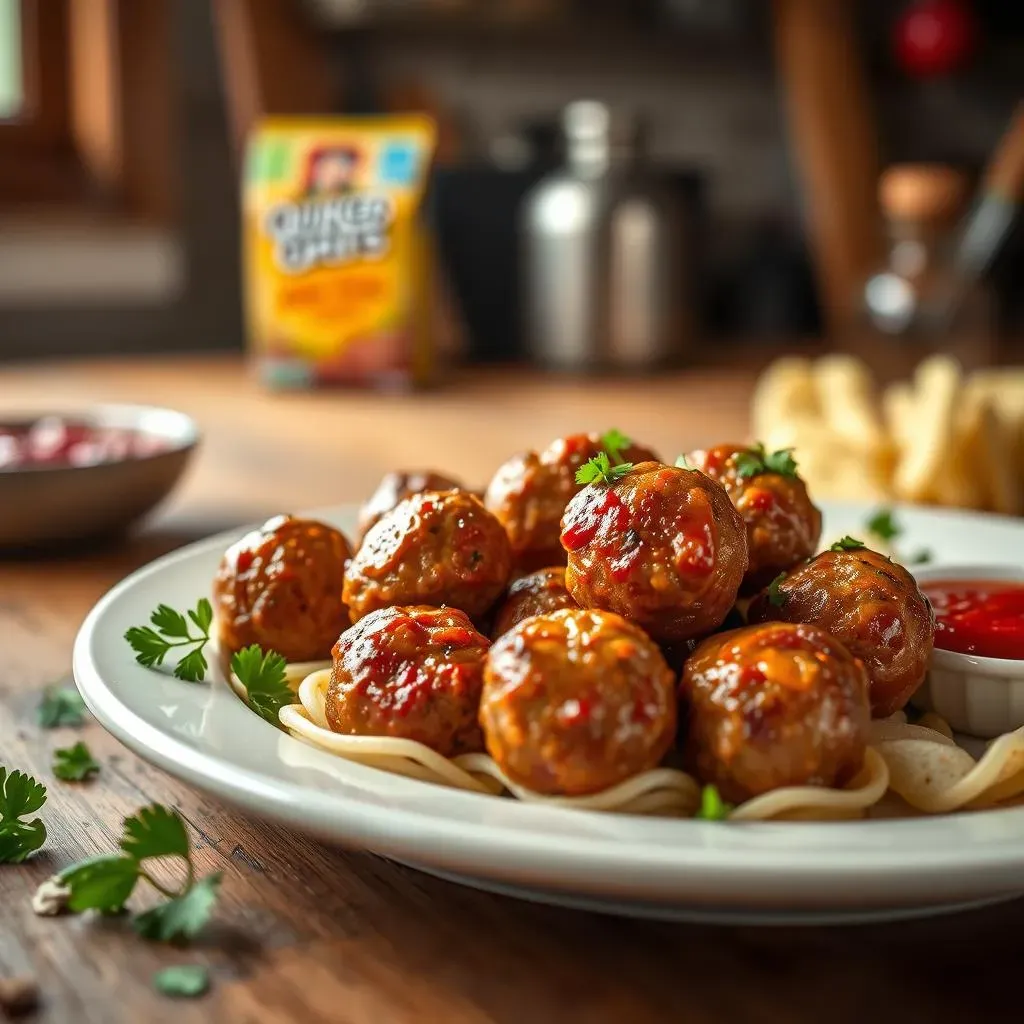Looking for a meatball recipe that's both delicious and surprisingly easy? Forget the breadcrumbs! The secret to incredibly tender and flavorful meatballs lies in a simple pantry staple: Quaker Oats. Yes, you read that right. A quaker oats meatball recipe can transform your weeknight dinners, adding a subtle sweetness and binding power that elevates your meatballs to a whole new level. This isn't your grandma's meatball recipe (unless your grandma was a culinary genius hiding a secret ingredient!).
Why Quaker Oats Elevates Your Meatball Recipe

Why Quaker Oats Elevates Your Meatball Recipe
so you're probably thinking, "Oatmeal in meatballs? Seriously?" I get it. It sounds a little out there, but trust me on this one. Swapping breadcrumbs for Quaker Oats is a game-changer. First off, oats act like a sponge, soaking up all those delicious meat juices and flavors, keeping your meatballs incredibly moist and tender. No one wants a dry, crumbly meatball, right? Plus, oats are naturally a little sweet, which adds a subtle depth of flavor that complements the savory meat perfectly. It's like a secret ingredient that everyone will notice but no one can quite put their finger on.
Another thing, oats help bind the ingredients together without making the meatballs dense or heavy. Breadcrumbs can sometimes make meatballs feel a bit… gluggy. But oats create a lighter, more delicate texture. And let's not forget the nutrition boost! You're sneaking in some extra fiber and whole grains without sacrificing any of the deliciousness. It’s a win-win!
Think of it this way: breadcrumbs are like that friend who always overpacks for a trip. They take up too much space and weigh everything down. Oats are like the minimalist packer – they get the job done efficiently and leave room for more fun (or, in this case, more flavor!). So, next time you're making meatballs, ditch the breadcrumbs and give Quaker Oats a try. You might be surprised at how much of a difference it makes.
Crafting the Perfect Quaker Oats Meatball: A StepbyStep Recipe

Crafting the Perfect Quaker Oats Meatball: A StepbyStep Recipe
Gather Your Ingredients: The Meatball Dream Team
Alright, let's get down to business! To make the most amazing Quaker Oats meatballs, you'll need a few key players. First, the meat: I usually go for a mix of ground beef and ground pork for the best flavor and texture. But feel free to use all beef, all pork, ground turkey, or even ground lamb – get creative! Next, of course, are the Quaker Oats. I prefer using quick-cooking oats, but rolled oats work too; just give them a quick pulse in a food processor to break them down a bit. You'll also need an egg to bind everything together, some grated Parmesan cheese for that salty, umami goodness, and some breadcrumbs. Finally, you'll need aromatics like minced garlic, chopped onion, and fresh herbs like parsley and oregano. Don't forget salt, pepper, and a pinch of red pepper flakes for a little kick!
Mixing and Rolling: Getting Your Hands Dirty (the Fun Part!)
Now for the fun part – getting your hands dirty! In a large bowl, combine all your ingredients. Gently mix everything together with your hands until just combined. Be careful not to overmix, or your meatballs will be tough. Nobody wants tough meatballs! Once everything is mixed, it's time to roll them into balls. I like to use a cookie scoop to ensure they're all the same size, but you can also just eyeball it. Aim for meatballs that are about 1-1.5 inches in diameter. As you roll, place the meatballs on a baking sheet lined with parchment paper. This prevents them from sticking and makes cleanup a breeze.
Baking to Perfection: The Oven's the Star
Preheat your oven to 400°F (200°C). Once the oven is hot, bake the meatballs for 18-20 minutes, or until they're cooked through and golden brown. The internal temperature should reach 160°F (71°C). While the meatballs are baking, you can prepare your favorite sauce. Whether it's a classic marinara, a creamy mushroom sauce, or a tangy sweet and sour glaze, the choice is yours! Once the meatballs are done, let them cool slightly before serving. You can serve them immediately with your sauce, or you can freeze them for later. To freeze, simply place the cooked meatballs on a baking sheet and freeze until solid. Then, transfer them to a freezer bag or container. They'll keep in the freezer for up to 3 months.
Ingredient | Quantity | Notes |
|---|---|---|
Ground Beef | 1 pound | 80/20 blend is ideal |
Ground Pork | 1/2 pound | Adds richness and flavor |
Quick-Cooking Quaker Oats | 1 cup | Acts as a binder and adds moisture |
Grated Parmesan Cheese | 1/2 cup | Adds salty, umami flavor |
Egg | 1 large | Binds the ingredients together |
Minced Garlic | 2 cloves | Adds aromatic flavor |
Chopped Onion | 1/2 cup | Adds sweetness and texture |
Fresh Parsley | 1/4 cup | Adds freshness and color |
Fresh Oregano | 1 tablespoon | Adds Italian flavor |
Salt and Pepper | To taste | Season generously |
Red Pepper Flakes | Pinch (optional) | Adds a little kick |
Beyond the Basics: Flavor Variations for Your Quaker Oats Meatballs

Beyond the Basics: Flavor Variations for Your Quaker Oats Meatballs
so you've mastered the basic Quaker Oats meatball recipe. Now, let's get adventurous! The beauty of this recipe is how easily it adapts to different flavor profiles. Feeling Italian? Add some sun-dried tomatoes, fresh basil, and a pinch of fennel seeds. Craving something spicy? Mix in some chorizo, chipotle peppers in adobo sauce, and a dash of cumin. Want an Asian-inspired twist? Try ground ginger, soy sauce, sesame oil, and chopped scallions. The possibilities are endless! Don't be afraid to experiment and create your own signature meatball flavors. It's all about having fun and letting your taste buds guide you.
Flavor Profile | Key Ingredients | Serving Suggestions |
|---|---|---|
Italian | Sun-dried tomatoes, basil, fennel seeds, Parmesan cheese | Serve with marinara sauce and spaghetti |
Spicy Mexican | Chorizo, chipotle peppers, cumin, cilantro | Serve in tacos or with rice and beans |
Asian-Inspired | Ginger, soy sauce, sesame oil, scallions | Serve with stir-fried vegetables or in a noodle soup |
Greek | Feta cheese, oregano, lemon zest, olives | Serve with tzatziki sauce and pita bread |
Quaker Oats Meatball Recipe: Tips, Tricks, and Troubleshooting

Quaker Oats Meatball Recipe: Tips, Tricks, and Troubleshooting
Meatball SOS: Common Problems and How to Fix Them
So, you're making Quaker Oats Meatballs and something goes wrong? Don't panic! Let's troubleshoot. Meatballs too dry? You probably didn't use enough fat in your meat mixture. Next time, opt for a higher fat percentage ground beef or add a tablespoon or two of olive oil to the mix. Meatballs too tough? You likely overmixed the ingredients. Remember, gentle is key! Also, make sure your oven temperature is accurate – an oven that's too hot can dry out the meatballs quickly. Meatballs falling apart? You might not have used enough binder. Add another egg or a bit more Quaker Oats to help hold everything together.
Another common issue is meatballs sticking to the pan. Always use parchment paper or a silicone baking mat to prevent sticking. If you're frying the meatballs, make sure your pan is hot enough before adding them, and don't overcrowd the pan. Overcrowding lowers the temperature and can cause the meatballs to steam instead of brown properly. And finally, if your meatballs are bland, don't be afraid to season aggressively! Salt is your friend. Taste the mixture before rolling the meatballs and adjust the seasoning as needed.
Meatball Masterclass: Pro Tips for Next-Level Flavor
Want to take your Quaker Oats Meatball recipe to the next level? Here are a few pro tips: First, bloom your spices. Before adding your spices to the meat mixture, heat them gently in a dry pan for a minute or two until fragrant. This releases their essential oils and intensifies their flavor. Next, use a combination of fresh and dried herbs. Fresh herbs add brightness and vibrancy, while dried herbs provide a more concentrated flavor. Don't be afraid to experiment with different combinations to find your perfect blend.
Another tip is to chill the meat mixture before rolling the meatballs. This helps the flavors meld together and makes the meatballs easier to handle. And finally, don't be afraid to experiment with different cooking methods. While baking is the easiest and most hands-off method, frying the meatballs in a pan creates a beautiful crust and adds extra flavor. You can also cook the meatballs in sauce, which infuses them with even more flavor. However you choose to cook them, remember to cook them until they're cooked through and golden brown. With a little practice and these pro tips, you'll be making restaurant-quality meatballs in no time!
Problem | Possible Cause | Solution |
|---|---|---|
Dry Meatballs | Not enough fat, overcooking | Use higher fat meat, add olive oil, reduce cooking time |
Tough Meatballs | Overmixing, oven too hot | Mix gently, ensure accurate oven temperature |
Falling Apart | Not enough binder | Add another egg or more Quaker Oats |
Sticking to Pan | No parchment paper, overcrowding | Use parchment paper, cook in batches |
Bland Meatballs | Not enough seasoning | Season aggressively, taste before rolling |
The Last Bite: Mastering the Quaker Oats Meatball Recipe
So, there you have it – the surprisingly simple, incredibly delicious secret to perfect meatballs: Quaker Oats. Whether you stick to our classic recipe or venture out with bold flavor combinations, incorporating oats into your meatball mix is a game-changer. From weeknight dinners to party appetizers, these meatballs are sure to impress. Now, go forth and create some meatball magic! Don't be afraid to experiment, tweak the recipe to your liking, and most importantly, enjoy the process. Happy cooking!